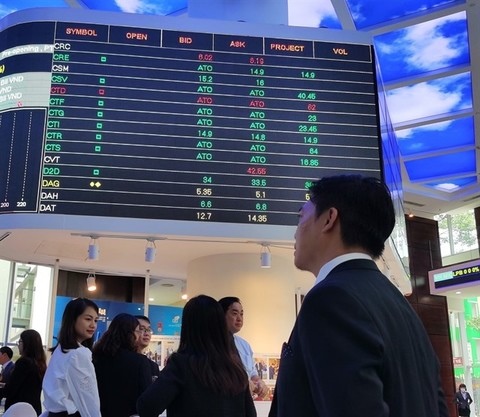|
ETFs continue to see strong outflows of foreign capital
After withdrawing a billion dollars from the stock market in 2023, foreign investors continued the trend in the first two months of 2024, with about VNĐ$2.4 trillion (US$97.2 million) net sold on the Hồ Chí Minh Stock Exchange (HoSE).

Investors look at a digital screen showing stock information at the Hồ Chí Minh Stock Exchange (HoSE). — VNA/VNS Photo
|
The strong outflow was largely due to the recent significant withdrawals from exchange-traded funds (ETFs).
Dragon Capital, the manager of the two largest ETFs - DCVFM VNDiamond ETF and DCVFM VN30 ETF - has experienced strong capital outflows since the beginning of 2024, totalling over VNĐ2 trillion, according to statistics.
The VNDiamond index-tracking fund, DCVFM VNDiamond ETF, has seen a net outflow of more than VNĐ1.6 trillion in the last two months, while the DCVFM VN30 ETF that replicates the performance of the VN30 index has recorded a net withdrawal of VNĐ409 billion.
In 2023, both of these funds also faced significant outflows, with the former experiencing a net withdrawal of nearly VNĐ3.7 trillion while the latter saw a net outflow of VNĐ946 billion.
The recent strong capital outflows from ETFs are part of a broader global trend that is currently taking place as the US Federal Reserve maintains a hawkish stance towards monetary policy.
In the latest meeting in January, the Fed kept benchmark interest rates unchanged for the fourth consecutive time. US interest rates remaining high have led to a tendency for capital to be withdrawn from markets with significant rate differentials between the local currency and the USD, including Việt Nam.
However, the intensity of the net selling trend in ETF funds decreased in the early months of the year compared to December.
A report from SSI Securities Corporation says that in the medium term, investment inflows into the Vietnamese market may benefit from funds shifting towards developing markets. But this is likely to occur only after the Fed begins to cut rates.
The biggest challenge Việt Nam faces in achieving an upgrade to emerging market (EM) status from its current frontier market status by the FTSE Russell is the requirement for pre-trade deposits for institutional investors.
SSI proposes two potential methods to address this issue. The first is a long-term solution involving the implementation of a central counterparty clearing house (CCP) clearing model. The second is a short-term solution where securities companies would provide payment support for institutional investors (a non-prefunding solution).
SSI anticipates that the decision to classify Việt Nam as an EM by FTSE Russell could take place as early as September 2024 (in an optimistic scenario) or March 2025 (in a baseline scenario), with the implementation becoming effective six months later.
Given Việt Nam’s current free float market capitalisation of around $35 billion, which is approximately one-fourth of Indonesia and Thailand, SSI estimates that the country’s proportion in the FTSE EM index would range from 0.7 to 1.0 per cent, and in the FTSE Global index, it would be approximately 0.1 per cent.
This could potentially attract immediate investments of around $1.7 billion - $2.5 billion to Việt Nam upon the effective implementation of the upgrade decision.
Similarly, Ketut Ariadi Kusuma, Head of the Finance, Competitiveness and Innovation Group at the World Bank in Việt Nam, believes that the stock market upgrade will provide a substantial driver for the country’s capital markets.
It will be seen as an attractive market for foreign investors, offering reasonable access and comparable market capitalisation and liquidity to many similarly developed countries.
The World Bank estimates that the stock market upgrade could attract up to $25 billion of fresh investments from international investors into the Vietnamese market by 2030.
Bizhub
|